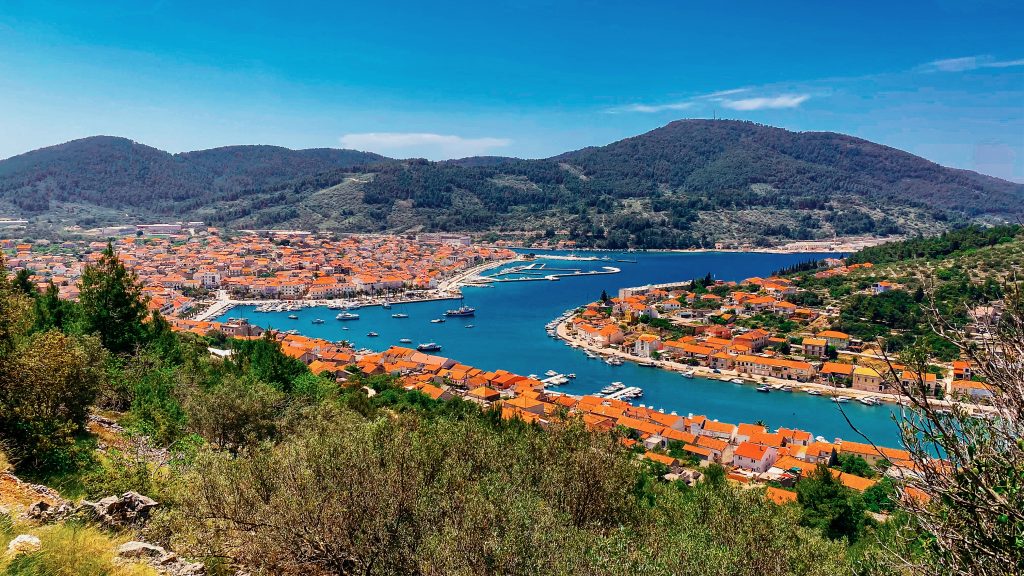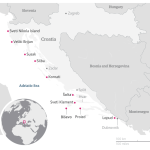If I blame myself for something in almost three years in Croatia, it is not having explored enough beyond the big cities and the most popular points of interest. The time has come to put excuses aside, the pandemic for example. It’s definitely easier to point to a place on the Croatian map and venture out when something strong drives you there. In this case, I felt the need to be alone for a few days and visit a remote place that I had not visited before.
I live in Split, and perhaps the most practical would be to choose somewhere on the islands of Brač, Šolta, Hvar, or Vis. However, my desire to escape was so intense that I felt that these islands were not far enough to satisfy my desires. I saw what other destinations were reachable by sea from the port of Split, and I chose Vela Luka. Interestingly, before I moved to Croatia, Vela Luka was a destination I always browsed on YouTube with my father. For some reason, it caught our attention. Taking that into account and the distance, I didn’t think twice.
There are two ways to get to Vela Luka from Split: by catamaran or by ferry. The catamaran is clearly faster, and the journey time is approximately two hours. The ferry, on the other hand, can take up to 3 hours and a half to reach Vela Luka. Something, however, made me opt for the ferry, and that is that in addition to not being in a big hurry, I felt that the size of the ferry offers you better observation points during the journey. My intention was not to sleep during the trip, but rather to take photos, record videos, and enjoy the views, so it makes sense. In case you ever ask yourself the same question, it is worth remembering that the price of the ferry and the catamaran to Vela Luka are the same: 54 kunas.
Leaving Split (First day – 10:30 am)
On a sunny and hot Monday, my ferry left the port of Split at 10:30 am as part of the Split-Vela Luka-Lastovo route. Around 11:15, the ferry crossed the passage between the islands of Brač and Šolta. Fifty minutes later, the ferry would pass in front of the town of Hvar, between the main island and the Pakleni islands. For a while, a thick mist replaced the scorching sun. Finally, at 13:20 pm, the ferry arrived at the port of Vela Luka, where the weather that greeted me was the same or even hotter than that of Split: 24 degrees.
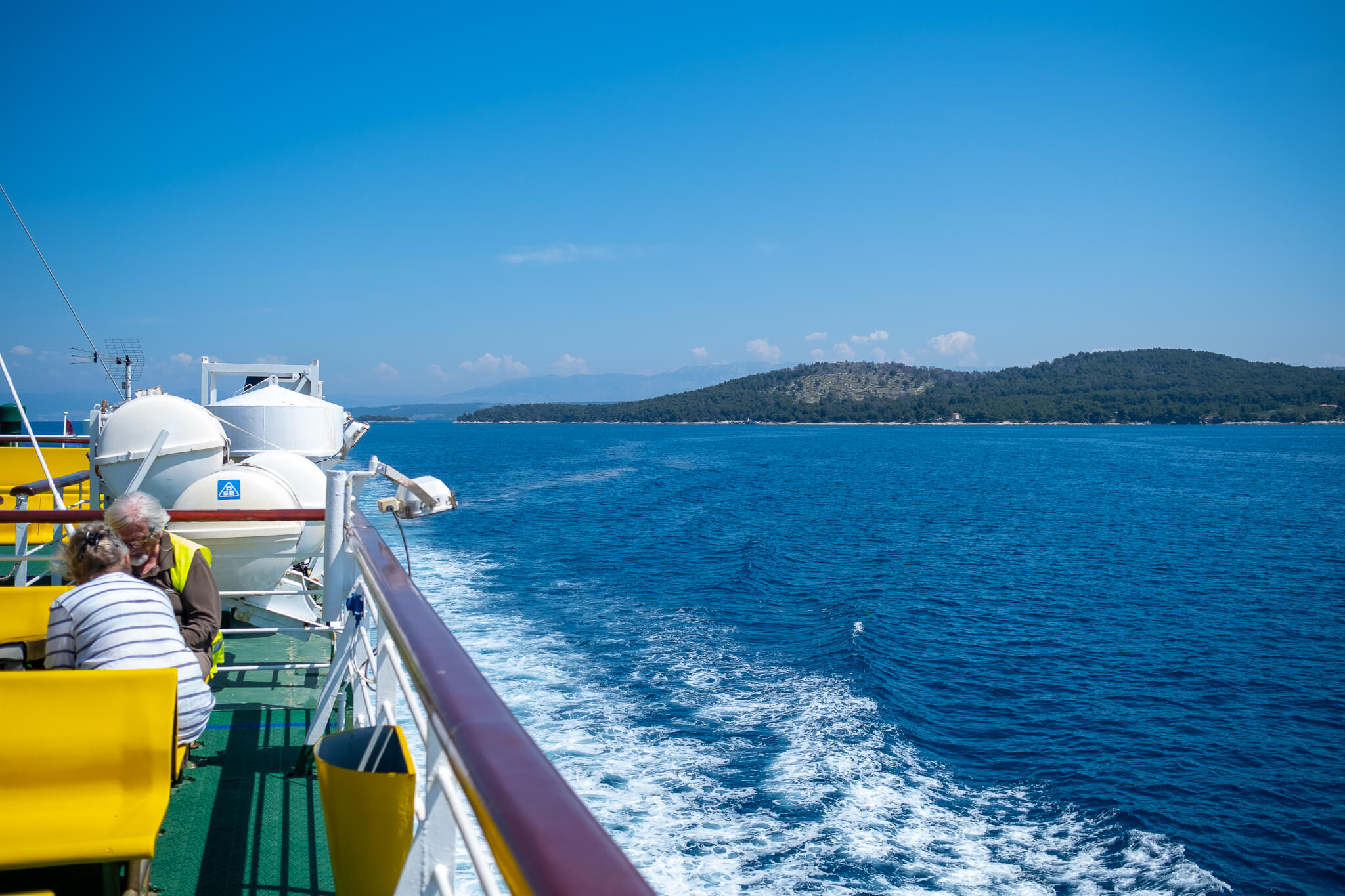
It’s not that I travel all the time on ferries, but if the weather is good, you’ll never see me inside one. Always on the deck enjoying the landscapes. (Photo: Jose Alfonso Cussianovich)
According to Jadrolinija, the Croatian national ferry company, it would arrive at 14:00 but it was a pleasant surprise to arrive half an hour earlier. It may not be much, but on a short trip that half-hour can really make a difference.
Arriving at Vela Luka (13:30 pm)
I rented a very nice family apartment close to the ferry port but managed to keep the feeling of isolation away from the center. At that time, the first thing I did was check-in, leave my things, and look for something to eat by the riva.
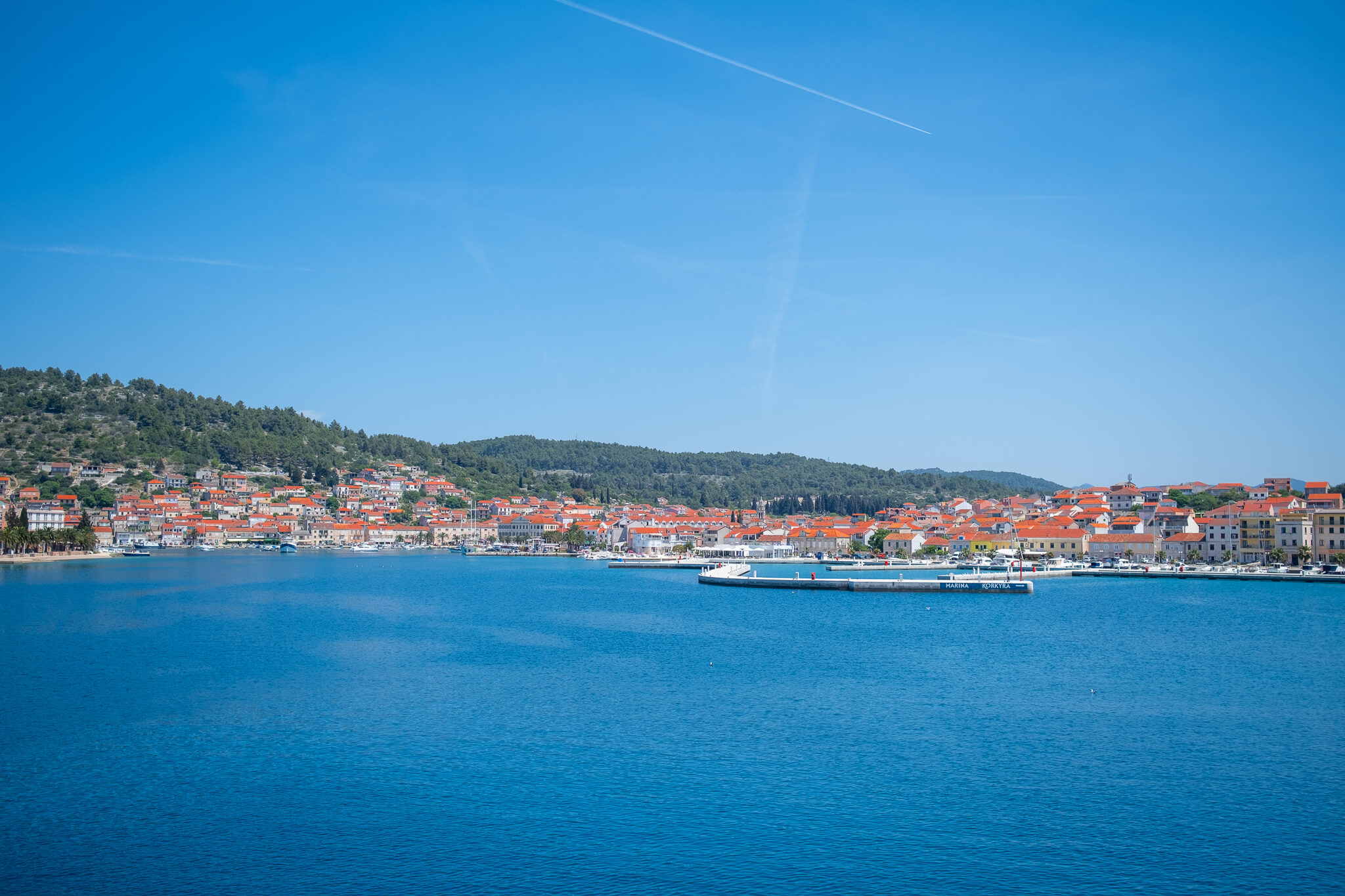
Arriving at Vela Luka. (Photo: Jose Alfonso Cussianovich)
Coming from Split, or recently in Dubrovnik, I was surprised to see so little tourist movement in Vela Luka. I wonder if it was because it was Monday, but it didn’t seem to go along with the tourist trends on the coast: silence, some empty restaurants, and bars. It’s not something that bothers me, but the opposite. I imagine that in places like Vela Luka, perhaps not as popular as Hvar, Bol, or Korčula, this wave of tourism takes perhaps a few more weeks to manifest itself. If you are one of those who are looking to enjoy a paradisiacal place in solitude, May is your month. If, on the other hand, you want to enjoy Vela Luka at its best, you may want to wait a few weeks for June or July to arrive.
Lunch at Konoba Skalinada (15:30 pm)
The good thing about the location of my apartment was that it was very close to where the Vela Luka boardwalk basically started. That allowed me, perhaps, not to miss a great culinary opportunity along the way. I’m not going to deny that before leaving I took a look at Google Maps for some recommendations, and I was beginning to worry about the number of restaurants that weren’t open yet or many that just opened after 5:00 p.m. I couldn’t wait two hours for lunch. After walking for about 20 minutes, I found a restaurant that met all the initial parameters: next to the riva, good views, enough shade to protect me from the heat, and, above all, open.
The name of the restaurant was Konoba Skalinada, a family restaurant with more than 10 years of a strong presence on the gastronomic charts of the island of Korčula. As a starter, I ordered a large, ice-cold Karlovačko to think clearly. This is a custom that you will see convenient when summer arrives. I noticed that the restaurant’s menu presented an abundant and diverse offer of seafood, and with great sadness, I realized that it would have been a better decision if it had been accompanied due to the enormous number of dishes for more than one person. But that is not a demotivation and much less an obstacle, and therefore I opted for some fried squid. Something told me that any dish is better served on an island, and I was not wrong.
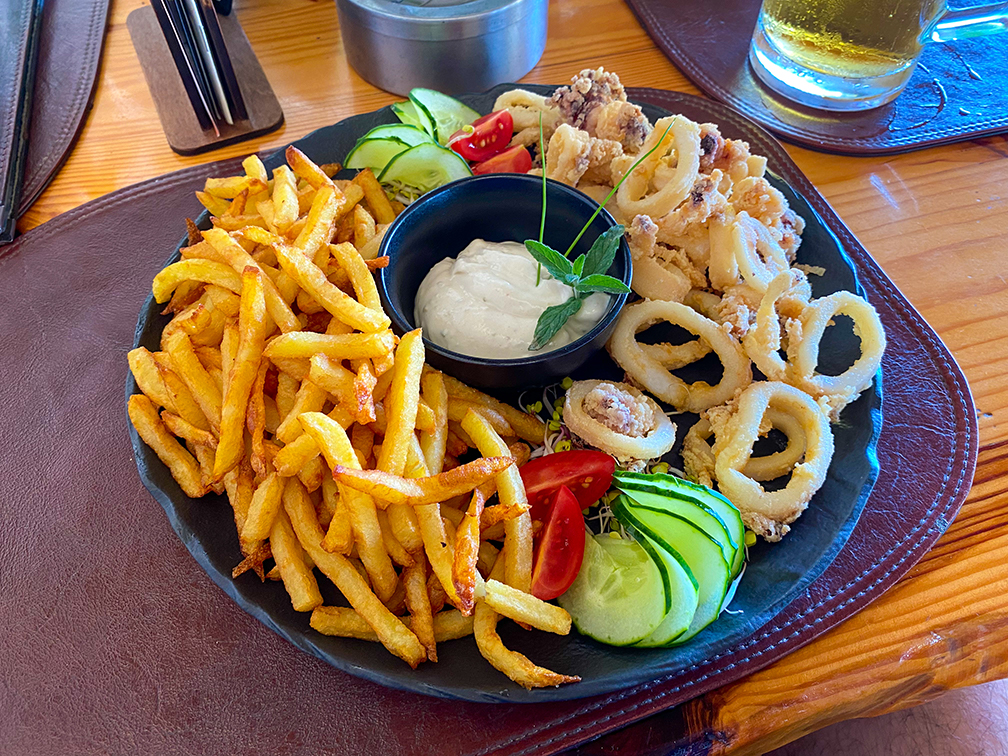
Spectacular food, excellent service, and ”još jedno” for another Karlovačko did the job. (Photo: Jose Alfonso Cussianovich)
Hiking the hill to Hum (18:00)
I walked back to my apartment to rest for an hour after the heavy lunch and the merciless sun, gather a few things, and embark on my next and last adventure of the day: climbing Hum Hill. From the Korkyra marina on the Vela Luka embankment, it can take about an hour and a half to walk up to Hum. Personally, I recommend doing it either early in the morning with a lot of energy, or in the afternoon after a good rest. I was inclined to go in the afternoon, even without the good rest, since I was curious to see the sunset. The road is suitable for hiking in the summer months, as it passes through shady forests.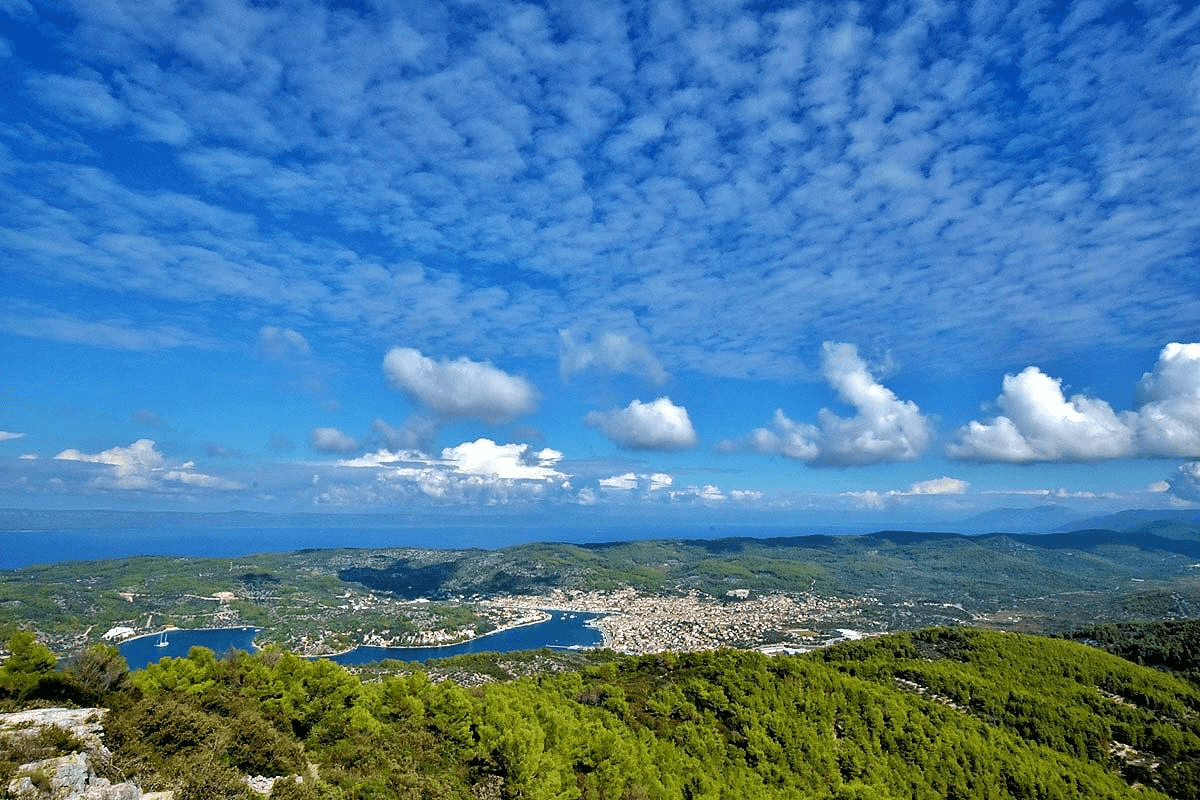
At the top, one encounters not only the Austro-Hungarian fortress of Hum but an unbeatable view of Vela Luka. (Image: Vela Luka Tourist Board)
After returning from the hike, I thought about going back to town for a beer or coffee to close the first day, but I was tired and had a lot planned for the next day. That is why I decided to close the day and sleep early.
Heading to Vela Spila (Second day – 10:30 am)
First on my itinerary for the second day was to visit the famous cave of Vela Spila, located on top of a hill behind Vela Luka’s Obala 2. In Vela Luka, you will notice that unlike the vast majority of cities and towns in Croatia, the streets do not have a name, but are identified by numbers. After stopping by the nearest Studenac to buy provisions such as water, bananas, tuna and some crackers, I started the trip.
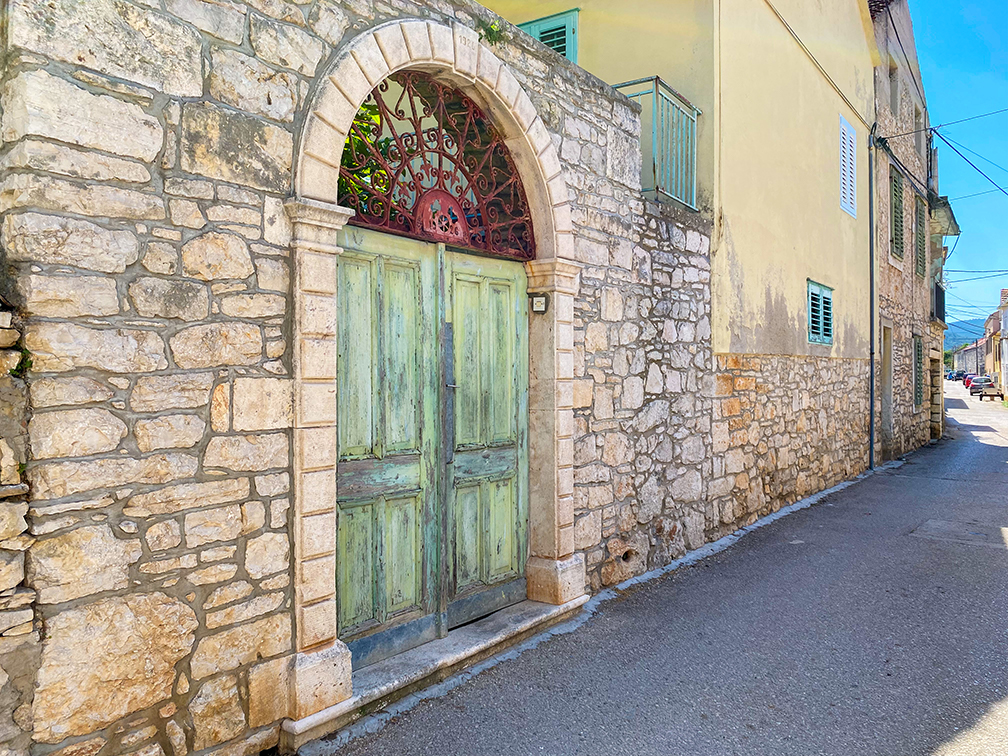
Most of the old houses in Vela Luka were built between the 19th and 20th centuries. This one is from 1926. (Photo: Jose Alfonso Cussianovich)
I’m not going to deny that it was a bit confusing to find my way around the numbered streets, but it wasn’t a problem. Vela Luka, contrary to other Dalmatian cities and towns, does not display Roman heritage and architecture so prominently in its streets and avenues. Although the human presence in the Vela Luka area can be traced back thousands of years, the town of Vela Luka began to develop only at the beginning of the 19th century. However, not having ancient stone houses or churches from centuries ago does not make it less beautiful than other similar destinations.
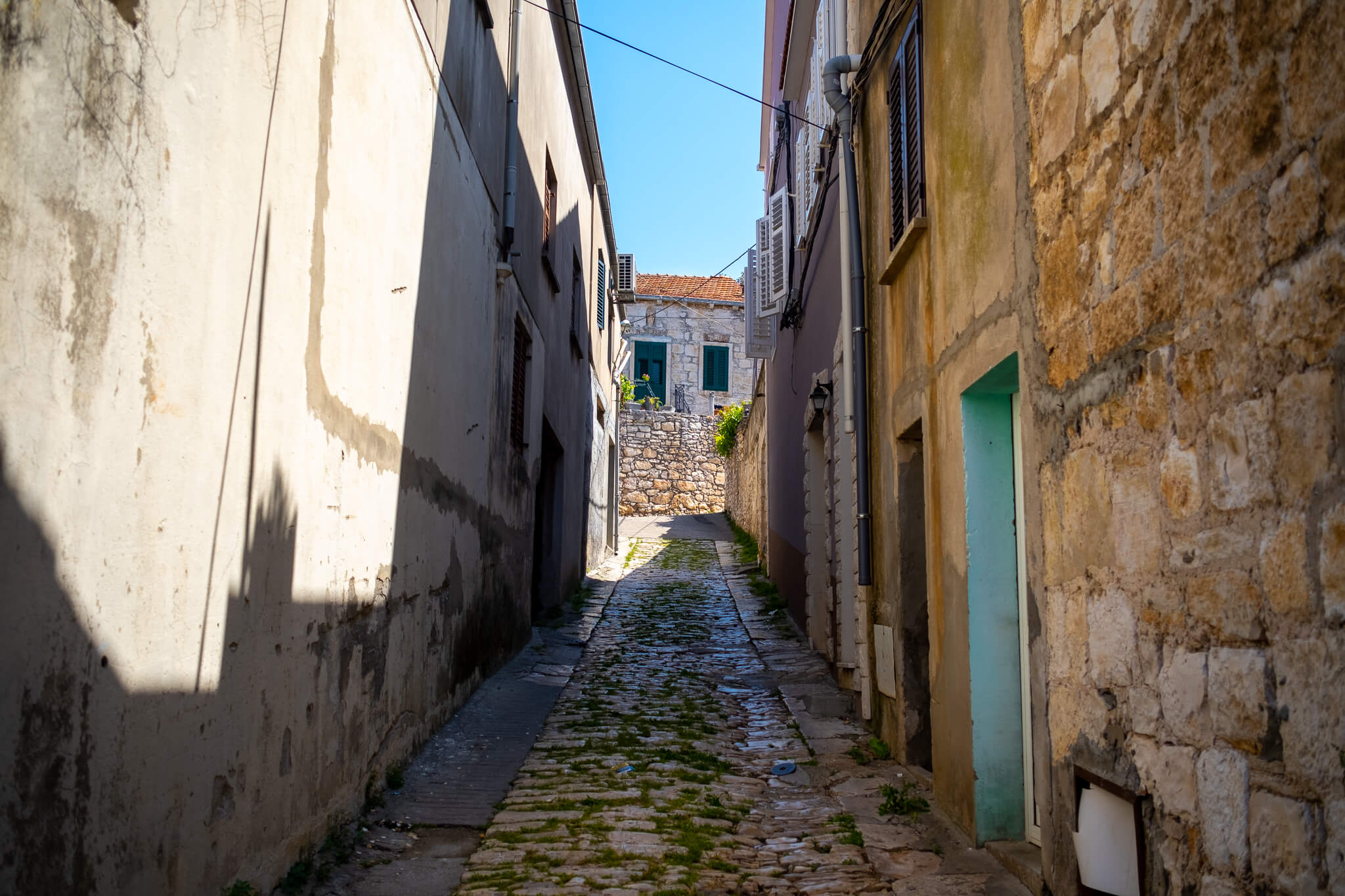
Photo: Jose Alfonso Cussianovich
After correctly locating the 16th street and then a strange steep passage, I managed to find the main track that leads to Vela Spila. After five minutes of walking, you will find a signpost that begins the relatively short uphill walk to Vela Spila. The route is as valuable as the destination, and on the way to Vela Spila you will turn your head as you climb the hill, and you will notice that the view makes everything worthwhile even despite the heat.
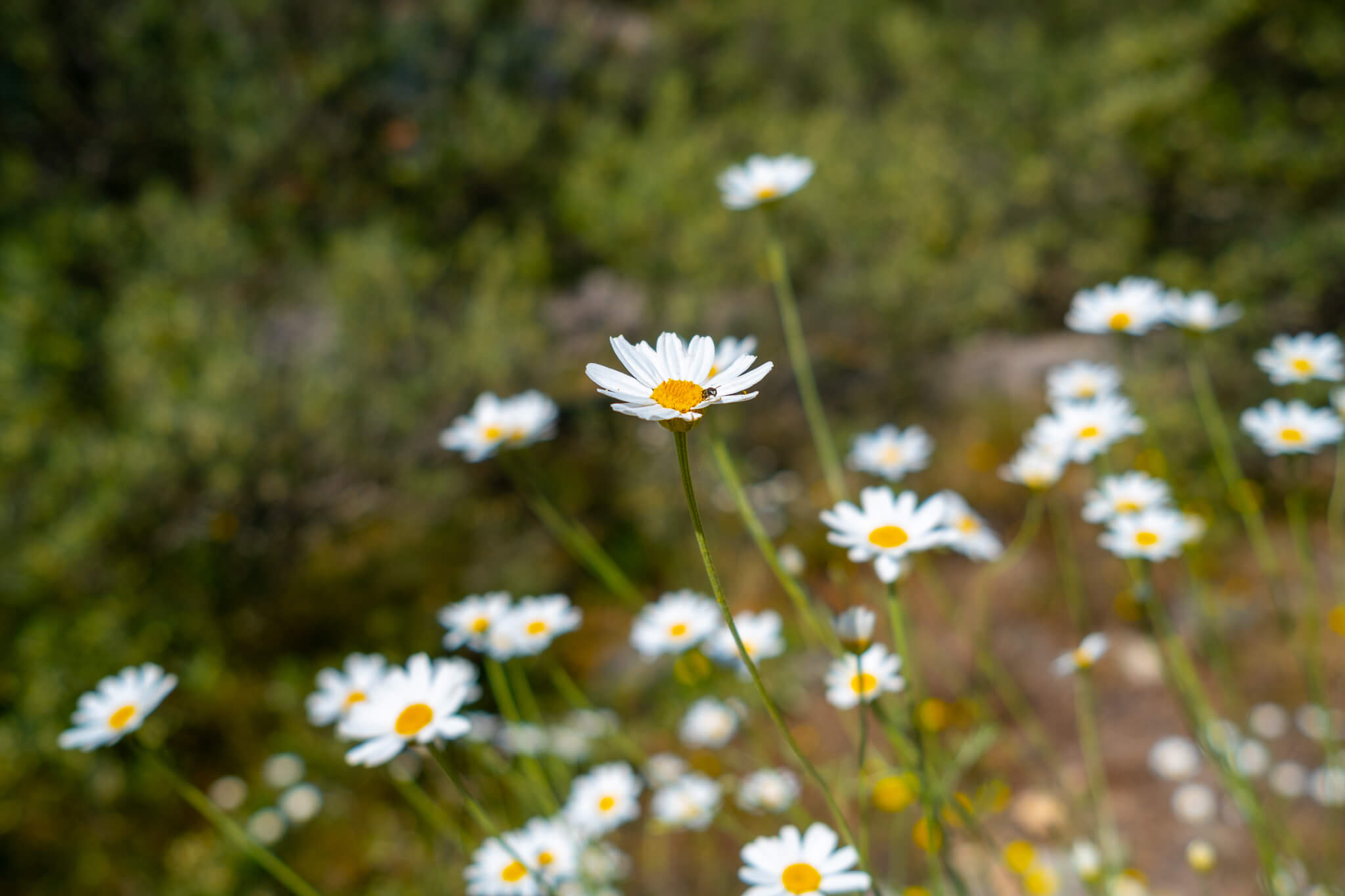
Tansy (Tanacetum cinerariifolium), or Buhač in Croatia. (Photo: Jose Alfonso Cussianovich)
In addition, you will find tansy, a tall and fragrant plant up to 60 cm that decorates the path to Vela Spila and that in the late 19th and early 20th centuries was cultivated in the Vela Luka area as a natural insecticide to care for crops. You’ll also notice the presence of carobs, a flowering evergreen tree also known as St. John’s Bread, whose sweet, brown fruit has been a part of human nutrition for up to 4,000 years.
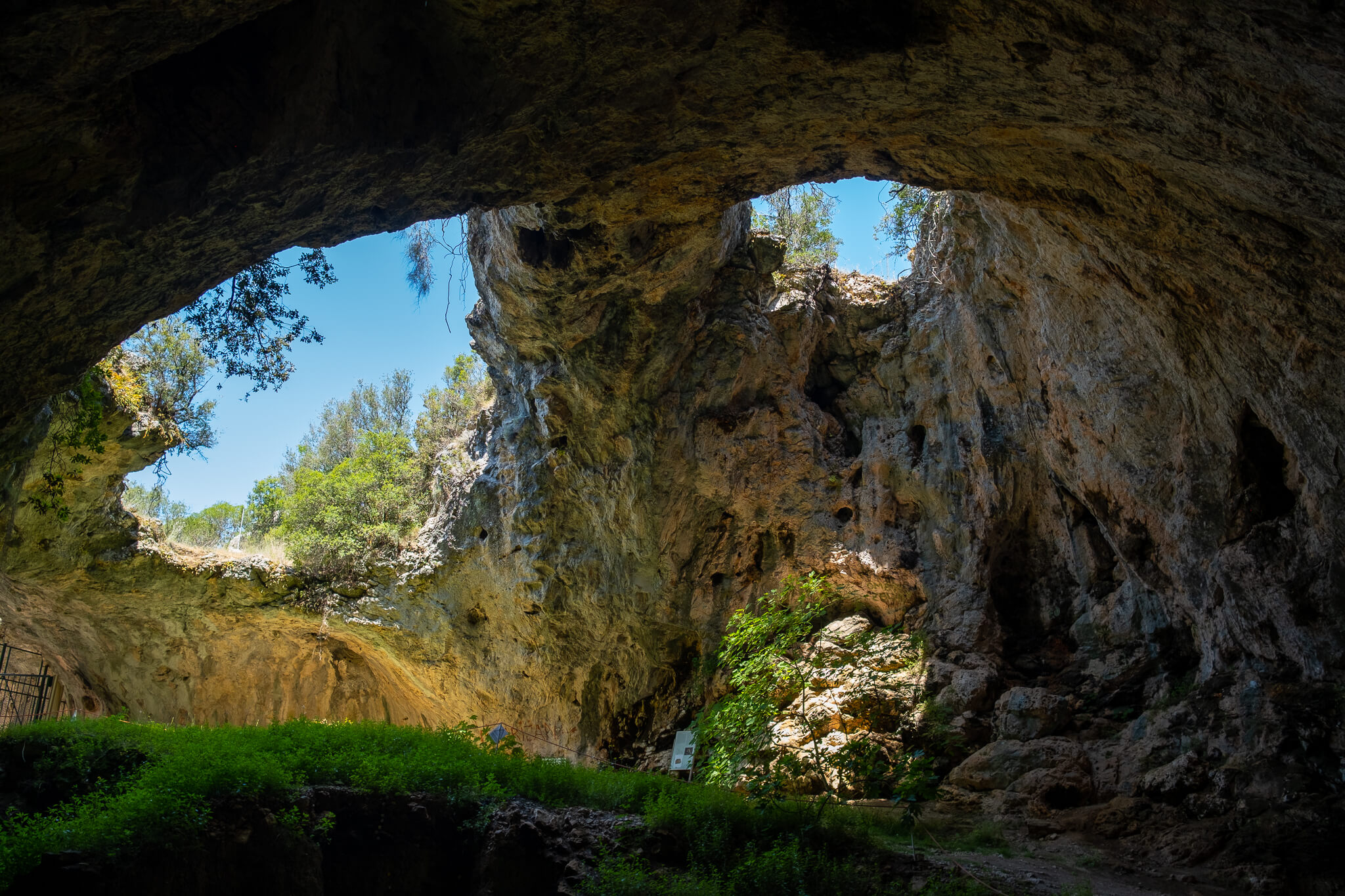
Vela Spila is an enormous lit cave that measures 50×30 meters, 20 meters high with an 8 meters entrance. Archaeological research over the past 50 years, now approximately 11 meters in depth from the original surface, shows its use by early humans from at least 20,000 years ago. (Photo: Jose Alfonso Cussianovich)
Getting to Vela Spila takes about 30 minutes from the center of Vela Luka, and it really is a great idea to include it as part of your itinerary on a sunny day in May or in the summer months. What better way to rest from the heat than in a cave? Even more so if the cave itself is a very important archaeological site, where remains and evidence of human presence in the Old Stone Age were discovered. The cave has only just been excavated to 7.5 meters deep, which leaves one’s imagination how much more can be found about even older human habitation.
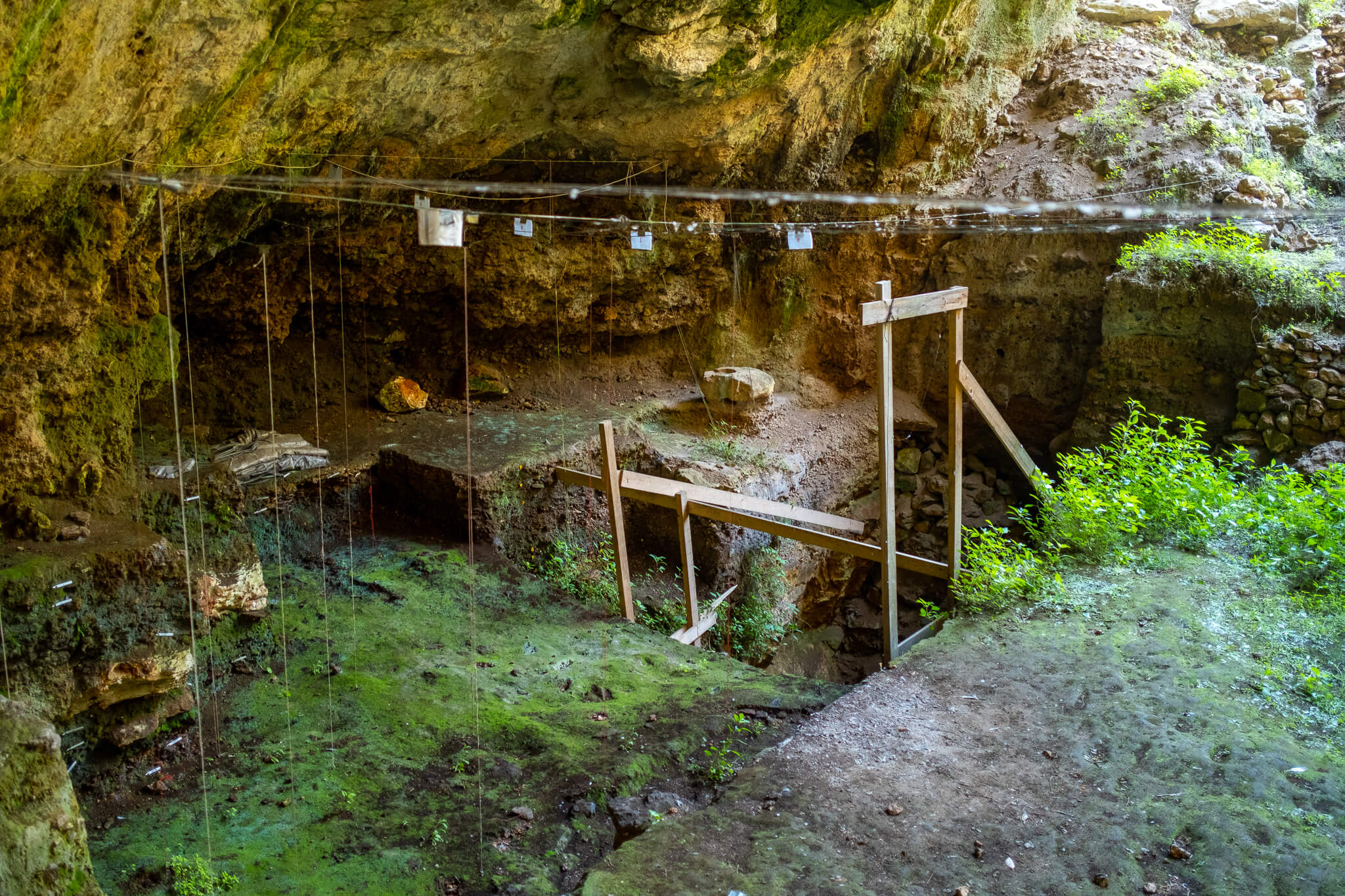
Keep in mind that the entrance fee to Vela Spila costs 15 kunas. (Photo: Jose Alfonso Cussianovich)
Hike to Martina Bok (12:30 pm)
After visiting Vela Spila, it sounds a bit strange not to choose a beach as the next stop on the itinerary. Vela Luka is well known for its countless beaches and coves along the west coast of the island of Korčula. I could have chosen any of the closest to the town, but to make the most of my short stay in Vela Luka, I set my sights on Martina Bok, a beach that is almost 7 kilometers from the center of Vela Luka and to get there a walk of approximately one hour and 45 minutes is needed.
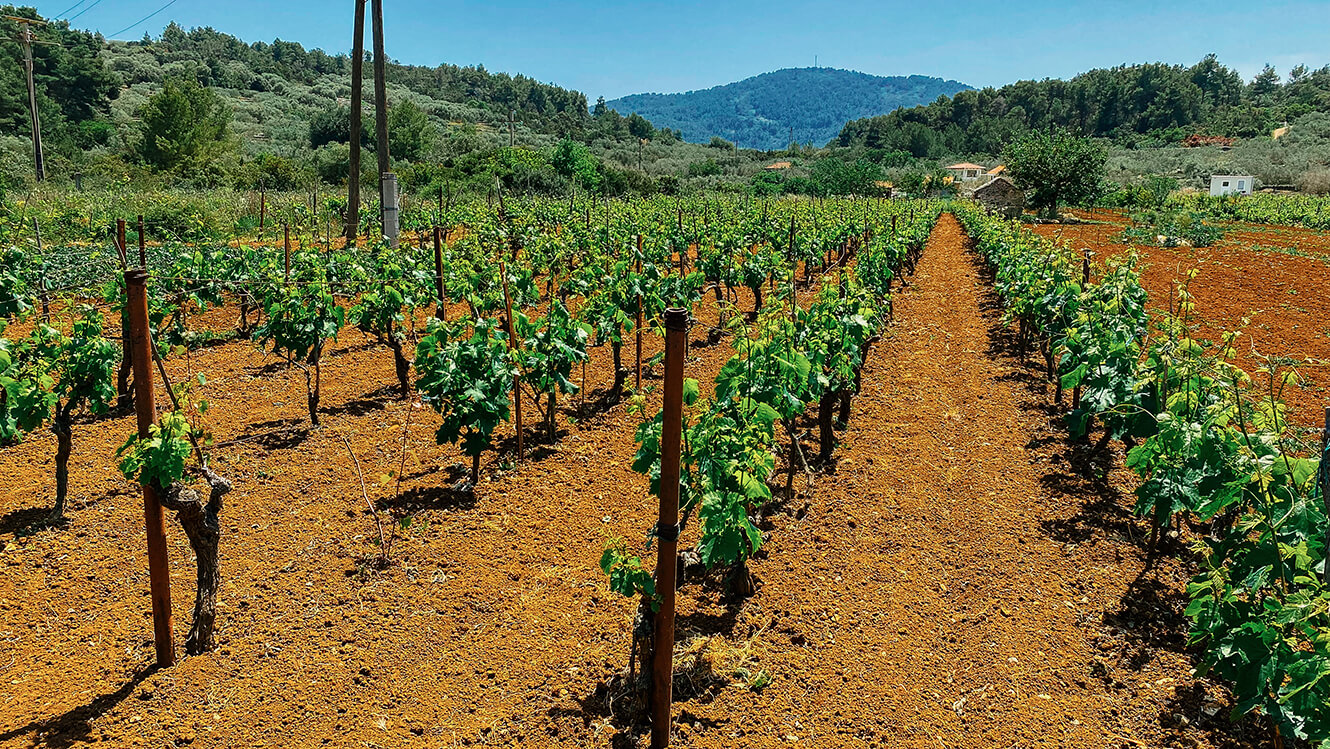
(Photo: Jose Alfonso Cussianovich)
I will anticipate the facts to confirm that it is worth going on foot. Yes, I could have rented a bike or hitched a ride, but I don’t know if I could have enjoyed those unique moments alone and pauses to appreciate everything I saw along the way. As well as being a great exercise for one, seeing so many olive trees, vineyards, fields, small old stone houses, and more is priceless. The heat was there, but a cool breeze accompanied me all the way to Martina Bok.
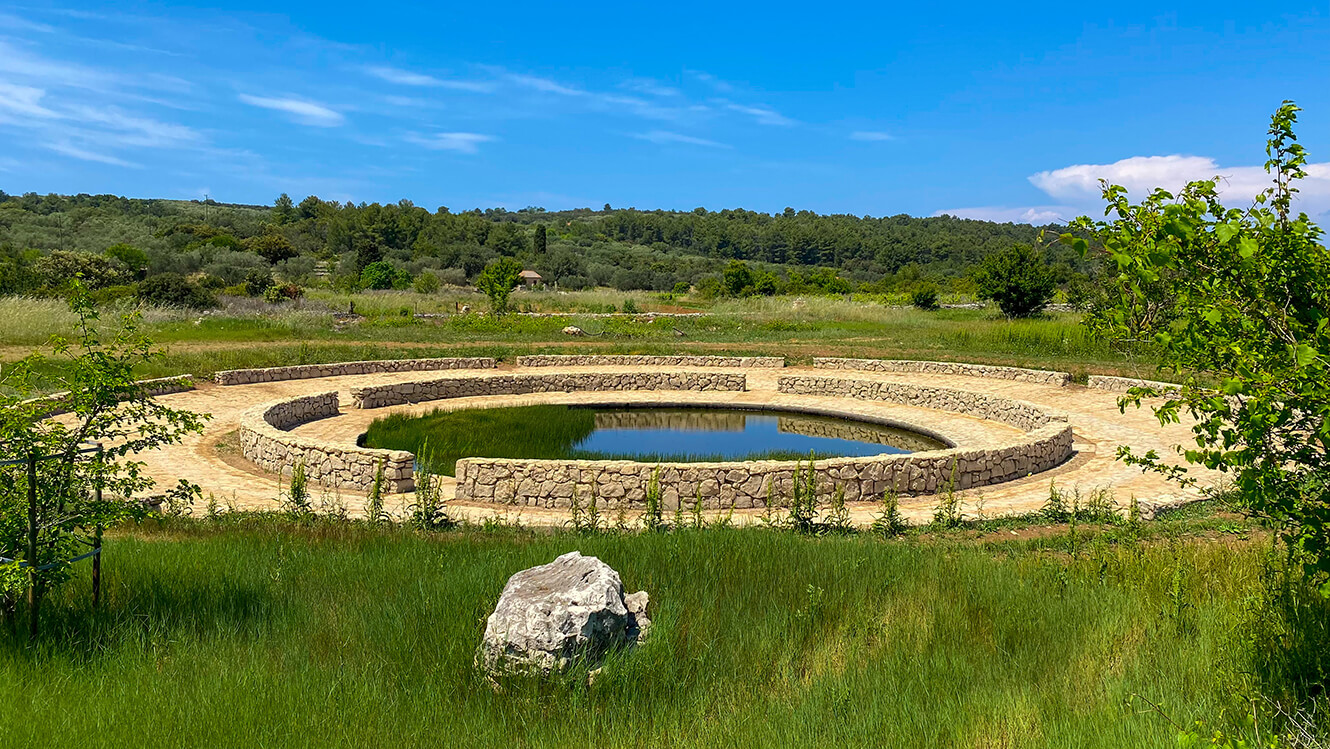
A water reservoir I found on the way to Martina Bok. (Photo: Jose Alfonso Cussianovich)
After an hour and a half of walking, I arrived at the entrance to the beach and it seems to have been naturally prepared to leave one speechless. After crossing a forest of pine and cypress trees, you come across Martina Bok, a beach characterized by its peculiar rock formation, its celestine waters, and the views towards the small island of Šćedro and the island of Hvar. Unbelievably, only one couple was on the beach and they were already coming back. A beach like this and only for me! It wouldn’t have bothered me if there were more people, but I remembered that the reason for my trip was to be alone and clear my head, and it seemed that the gods were reading my mind.
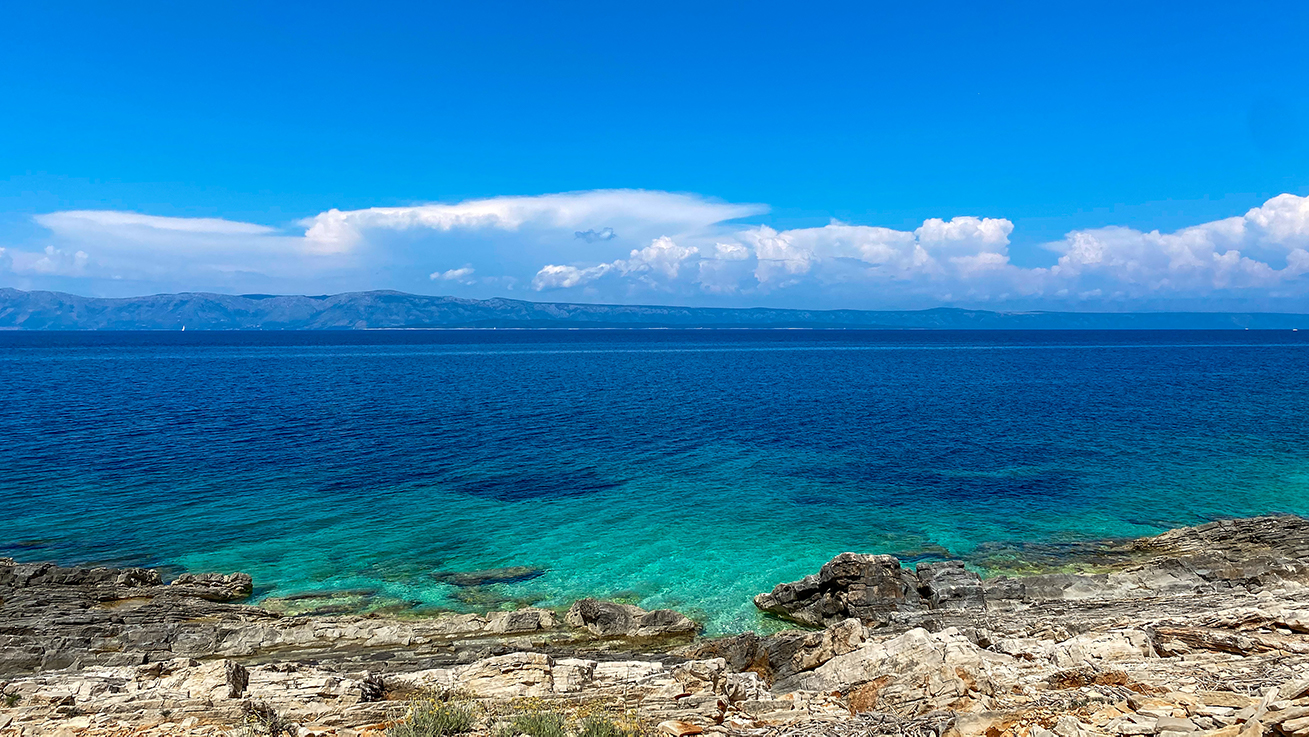
Martina Bok. (Photo: Jose Alfonso Cussianovich)
It will not be the ideal beach to lie down and sunbathe, due to the shapes of the rocks, but with the heat and after the long walk that brought me to Martina Bok, I spent more time in the water than out. What pleased me the most was confirming for myself that the temperature of the water is already more than suitable for a dip.
Back in Vela Luka (16:30 pm)
At approximately 15:40 I started the way back to Vela Luka. This time I must admit that I regretted not having any means of transportation to return to town, but I had already assimilated going on foot again. The only thing that worried me was getting too tired to not take advantage of my last night in Vela Luka, but once again it seems that the stars aligned in my favor.
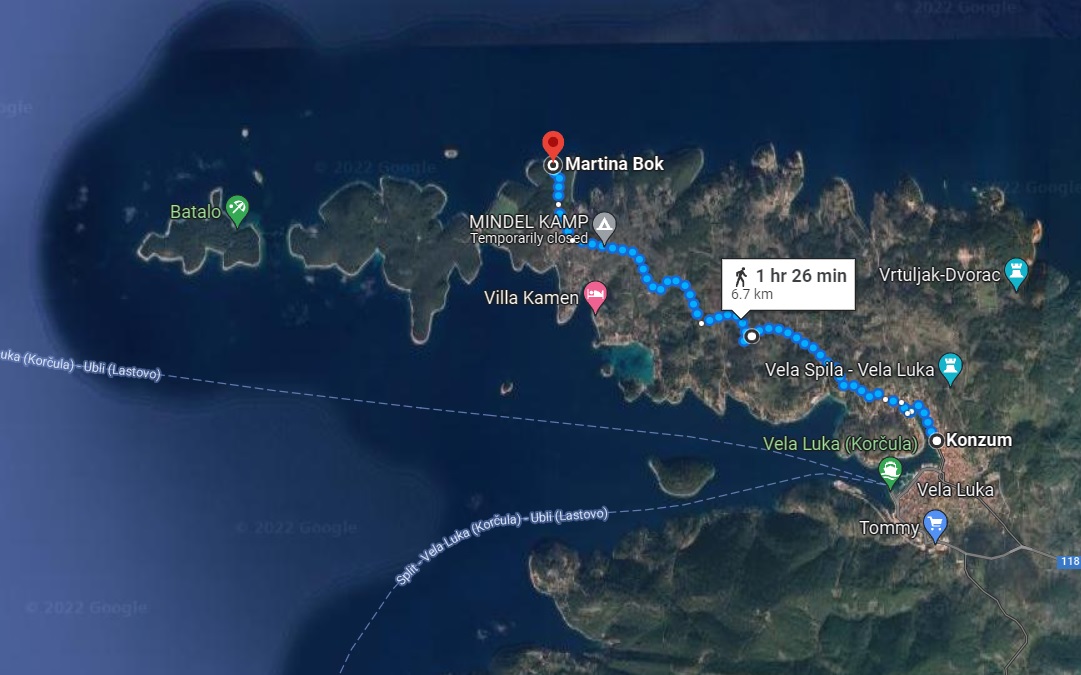
This was my route from Vela Luka to Martina Bok. Beautiful hike, but renting a bike isn’t a bad idea!
After walking for half an hour, I heard a car that was going in my direction pull up behind me. I turned around and a lady asked me, “Vela Luka?” With a relieved and almost suffering voice, I replied, “Yes, please.” I got on and thanked her for the ride, and I couldn’t hide how happy I was to save myself so much time to get back. Her name was Aloisia, a Croatian-German who lives in Hamburg, but every year she returns to Vela Luka, where she grew up, to take refuge in paradise.
The kind-hearted lady dropped me off at the very center of Vela Luka. My plan for the rest of my stay will be simple: go back to the apartment, take a shower, rest a bit, and go back to town for ice cream and watch the sun go down. So it was.
Ice Cream at Diana Gelato (19:00 pm)
On my previous walks, when looking for a place to have lunch on the first day, or when looking for the way to Vela Spila, an ice cream stand with many customers on both days had already caught my attention: Diana Gelato. I mean, again one place ticked all the boxes: location, availability, menu, everything. Once I was sitting there, with a spectacular stracciatella ice cream in my hand and watching the sun disappear, I could say that my brief journey to Vela Luka had concluded satisfactorily.
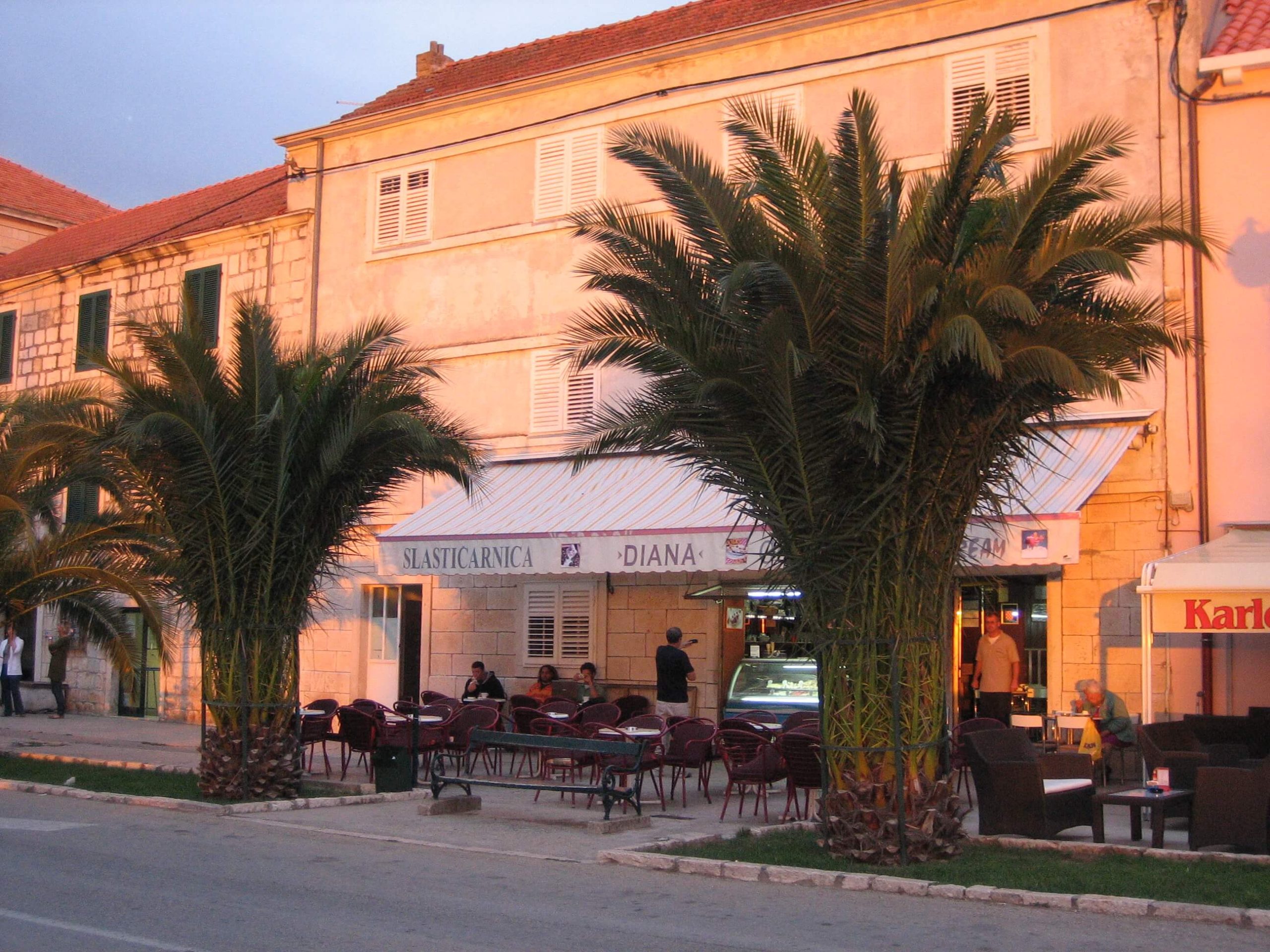
Image: Diana Gelato
The next day I was at 6:05 am in the port of Vela Luka to board the ferry that left 10 minutes later. Definitely, a precious hour to navigate the waters of the Adriatic, and even more so with my head in the right place knowing that I was able to make the most of my time in Vela Luka.
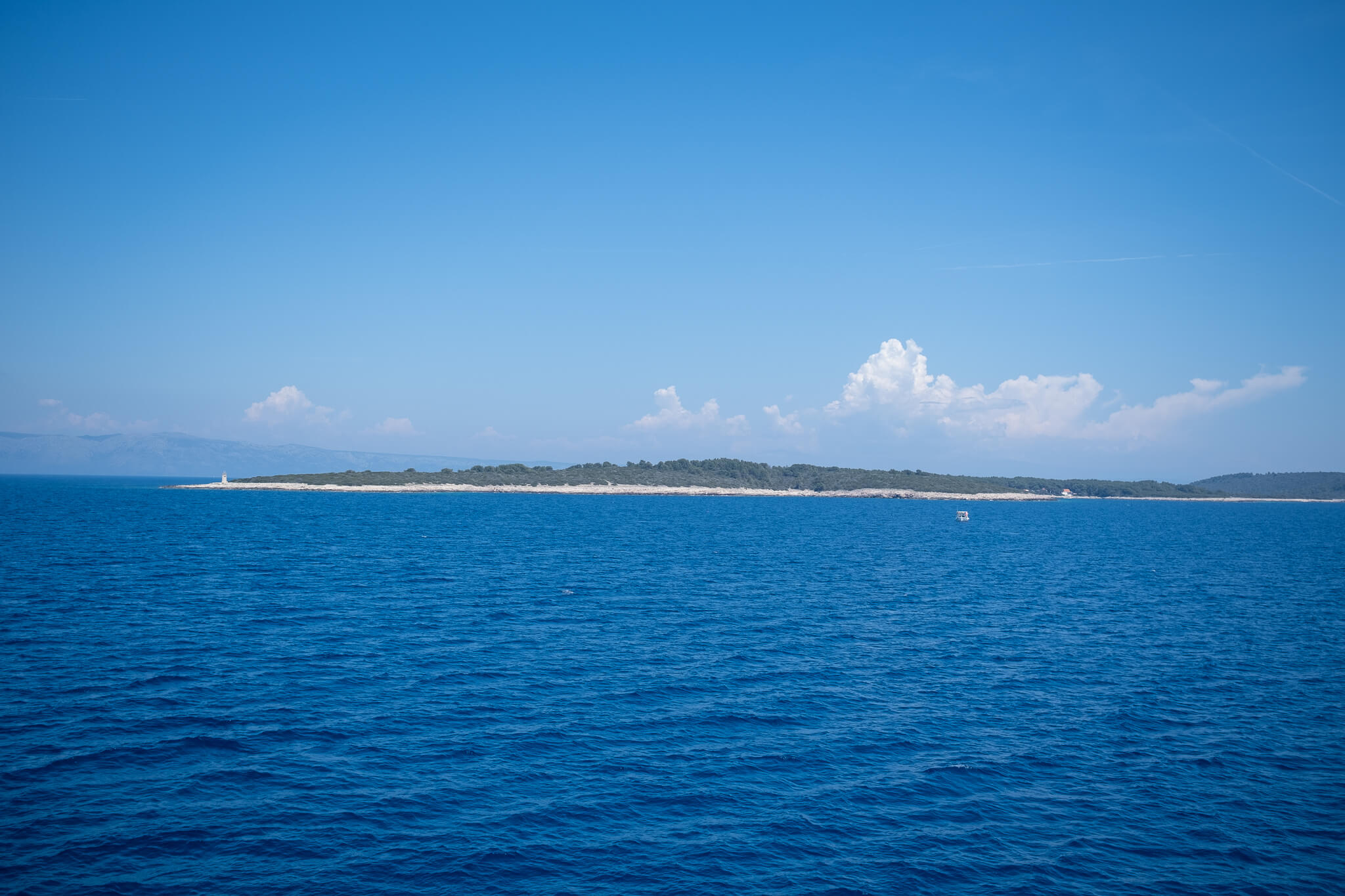
Visiting the islet of Proizd is a must if you go to Vela Luka. (Photo: Jose Alfonso Cussianovich)
Definitely, no destination can be covered in its entirety in just two days, and many activities could not be carried out for reasons beyond my control. For example, there is no trip to Vela Luka without a boat ride to the small and nearby islet of Proizd, famous for its spectacular beaches. Unfortunately, boat services to Proizd are not in service yet. Surely in the coming weeks, as we move further into summer, they will begin to set sail for that islet.
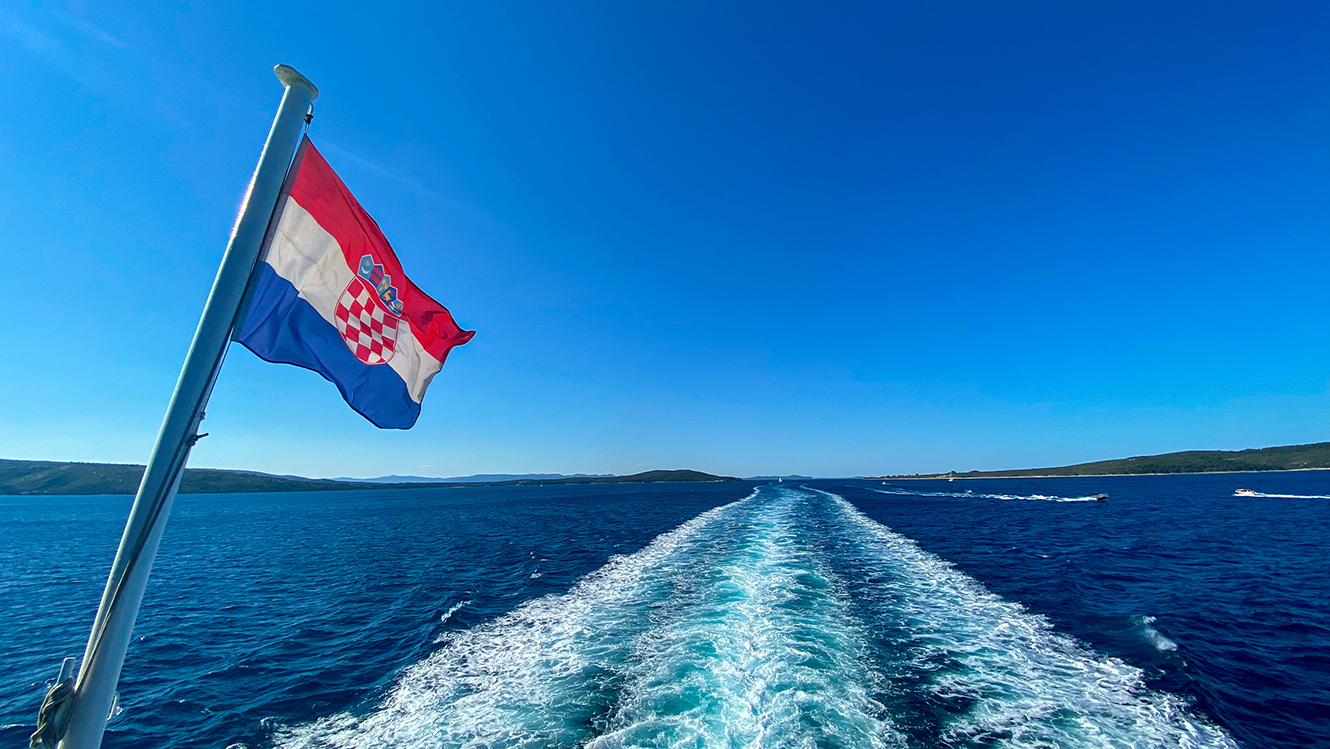
Photo: Jose Alfonso Cussianovich
This was my itinerary, but I’m sure you can be even more creative than me!
For more on travel in Croatia, follow TCN’s dedicated page.

